Machtspiele / Power Struggle
Authors: Bauldric & Friends
Publisher: Eggertspiele / Hutter Trade
Year: 2009
review by

| x |
|
|
|
|
|
|
|
|
|
|
|
|
|
|
|
|
|
|
|
|
|
|
|
|
|
|
|
|
|
|
|
|
|
|
|
|
|
|
|
|
|
|
|
|
|
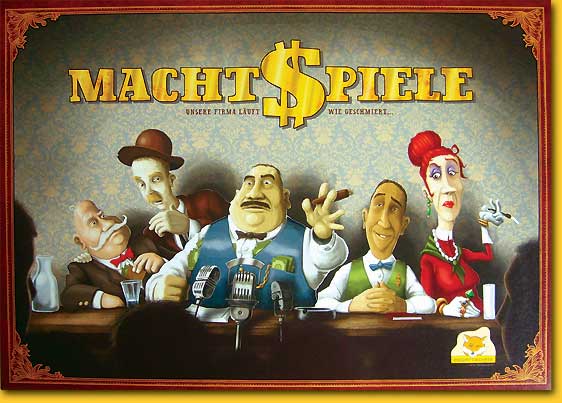 |
| x |
|
|
|
|
|
|
|
|
|
|
|
|
|
|
|
|
|
|
|
|
|
|
|
|
|
|
|
|
|
|
|
|
|
|
|
|
|
|
|
|
|
|
|
|
|
|
Of course in real life we are all honest, righteous and dedicated employees that value the wellbeing of the company and our colleagues. But in this game we are going berserk! We suck up to those that are higher in rank whilst ruthlessly trampling those beneath us, and due to constant reorganisations our departments have a lifetime hardly exceeding that of a mayfly. We plot and scheme our way through the office jungle, we have no mercy, nobody is spared. The deals that we make amongst each other offer no guarantee whatsoever. We even have an archenemy, which we treat even worse than the rest. Our eventual goal is to obtain as much power, influence and money as possible.
|
|
|
|
|
|
| x |
|
|
|
|
|
|
|
|
|
|
|
|
|
|
|
|
|
|
|
|
|
|
|
|
|
|
|
|
|
|
|
|
|
|
|
|
|
|
|
|
|
|
|
|
|
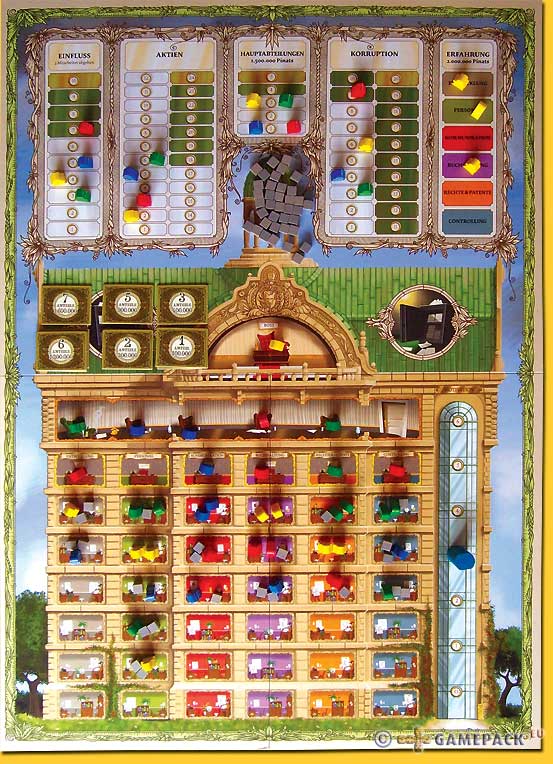 |
| x |
|
|
|
|
|
|
|
|
|
|
|
|
|
|
|
|
|
|
|
|
|
|
|
|
|
|
|
|
|
|
|
|
|
|
|
|
|
|
|
|
|
|
|
|
|
|
The board depicts a company with six different departments, a boardroom and the chairman's office. Victory points can be obtained in six different areas, and the first player to collect four wins the game. There are four tracks that yield a victory point each when a player reaches the green area.
|
|
|
|
|
|
| x |
|
|
|
|
|
|
|
|
|
|
|
|
|
|
|
|
|
|
|
|
|
|
|
|
|
|
|
|
|
|
|
|
|
|
|
|
|
|
|
|
|
|
|
|
|
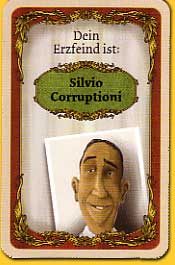 |
|
For example, players who regularly reside in the board room or the chairman's office get one point, and the same goes for a player who owns at least 18 shares of the company. Leading four main departments also results in one point. And at the beginning of the game each player receives a random card indicating who his archenemy is, and in what areas he has to outshine him. If he succeeds: one victory point. |
|
|
|
|
|
| x |
|
|
|
|
|
|
|
|
|
|
|
|
|
|
|
|
|
|
|
|
|
|
|
|
|
|
|
|
|
|
|
|
|
|
|
|
|
|
|
|
|
|
|
|
|
| Each round begins with dismissing the chairman. The new chairman is the player with the most managers in the boardroom. Not only the chairman is regularly replaced: the divisional heads of the six departments are also subject to change. The player with the majority of managers in the department becomes the new divisional head, and he places a manager in the corresponding office. |
|
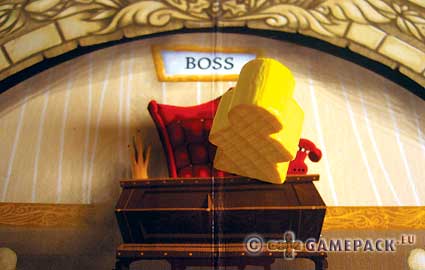 |
| x |
|
|
|
|
|
|
|
|
|
|
|
|
|
|
|
|
|
|
|
|
|
|
|
|
|
|
|
|
|
|
|
|
|
|
|
|
|
|
|
|
|
|
|
|
|
 |
The job comes with a privilege: the new head receives the privilege card from the former head. The privileges include taking over employees from a competitor, a discount when buying shares, earn extra money on pay day, or performing an additional action at the beginning of each round. Subsequently all players climb up the influence track: one step for each manager in the boardroom, two steps for the chairman. |
|
|
|
|
|
| x |
|
|
|
|
|
|
|
|
|
|
|
|
|
|
|
|
|
|
|
|
|
|
|
|
|
|
|
|
|
|
|
|
|
|
|
|
|
|
|
|
|
|
|
|
|
|
This is followed by the action phase. The divisional head of the Communication department plays an important role: he draws six random plus two standard event cards, and secretly arranges them in any order of his choice. He is the only one who knows which events will occur, and in what order. One of the standard events is Bonus payment, and the other is Directors meeting, which indicates the end of the round. All event cards after the directors meeting are not carried out anymore: this way, the head of Communication determines how long the action phase lasts.
|
|
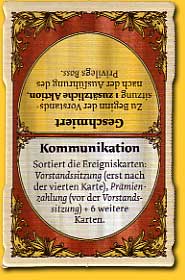 |
|
|
|
|
| x |
|
|
|
|
|
|
|
|
|
|
|
|
|
|
|
|
|
|
|
|
|
|
|
|
|
|
|
|
|
|
|
|
|
|
|
|
|
|
|
|
|
|
|
|
|
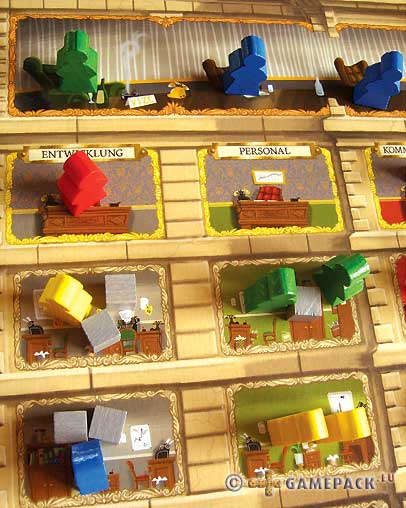 |
|
Each round of the action phase consists of carrying out the top event card, followed by one action for each player. Possible actions are hiring new employees, buying shares, creating a department, restructuring departments, or bribing other players. To bribe someone, the player places an amount of money in his bribe folder and hands it to the other player, while indicating which privilege card he wants to receive in return.
|
|
|
|
|
|
| x |
|
|
|
|
|
|
|
|
|
|
|
|
|
|
|
|
|
|
|
|
|
|
|
|
|
|
|
|
|
|
|
|
|
|
|
|
|
|
|
|
|
|
|
|
|
|
If the player accepts the bid, he keeps the money and the bribing player gets the privilege card. The card is turned towards the 'bribed' side: the privileges on this side are even more favourable than on the standard side! The bribing player receives one point on the corruption track, and the bribed player only if he chooses to accept the offer. As soon as a player reaches nine corruption points, he gets one victory point.
When the Directors meeting card shows up, the round is finished. A new round starts again, and this is repeated until one of the players has collected four victory points.
|
|
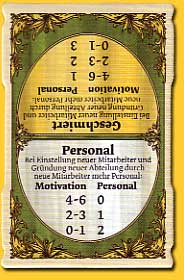 |
|
|
|
|
|
| x |
|
|
|
|
|
|
|
|
|
|
|
|
|
|
|
|
|
|
|
|
|
|
|
|
|
|
|
|
|
|
|
|
|
|
|
|
|
|
|
|
|
|
|
|
|
| x |
|
|
|
|
|
|
|
|
|
|
|
|
|
|
|
|
|
|
|
|
|
|
|
|
|
|
|
|
|
|
|
|
|
|
|
|
|
|
|
|
|
|
|
|
|
| x |
|
|
|
|
|
|
|
|
|
|
|
|
|
|
|
|
|
|
|
|
|
|
|
|
|
|
|
|
|
|
|
|
|
|
|
|
|
|
|
|
|
|
|
|
|
 |
|
|
|
|
|
|
|
|
|
|
|
|
|
|
|
|
|
|
|
|
|
|
|
|
|
|
|
|
|
|
|
|
|
|
|
|
|
|
|
|
|
|
Machtspiele comes with an impressive set of rules: 16 pages! It is quite a laborious task to work your way through them, and it will not be a surprise that it takes at least half an hour to explain everything to the other players.
|
|
|
|
|
|
| x |
|
|
|
|
|
|
|
|
|
|
|
|
|
|
|
|
|
|
|
|
|
|
|
|
|
|
|
|
|
|
|
|
|
|
|
|
|
|
|
|
|
|
|
|
|
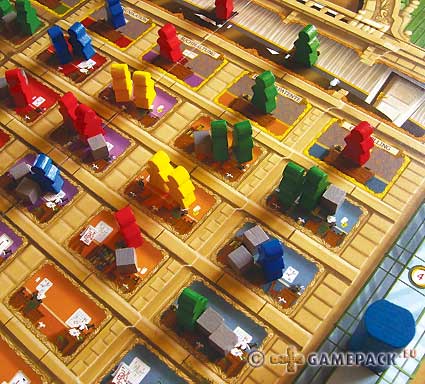 |
|
Luckily, the game summary is more or less complete, which is a good thing because there are too many actions with too many small details to memorise. Despite the plethora of actions, they all come down to the same thing: create new departments, restructure departments, move departments, expand departments, fuse departments et cetera. This makes the action phase very repetitive and rather boring.
|
|
|
|
|
|
| x |
|
|
|
|
|
|
|
|
|
|
|
|
|
|
|
|
|
|
|
|
|
|
|
|
|
|
|
|
|
|
|
|
|
|
|
|
|
|
|
|
|
|
|
|
|
|
The event cards are also not very eventful; they usually contain a bit of text with the result that the motivation of the employees increases or decreases. This is important for some of the privilege cards: the lower the motivation, the more favourable the privilege. The privilege cards can be obtained in two ways: earning them by becoming divisional head, or bribing the divisional head.
|
|
 |
|
|
|
|
|
| x |
|
|
|
|
|
|
|
|
|
|
|
|
|
|
|
|
|
|
|
|
|
|
|
|
|
|
|
|
|
|
|
|
|
|
|
|
|
|
|
|
|
|
|
|
|
|
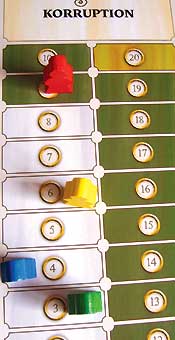
|
|
The bribing is probably the nicest element of the game. It adds to the flavour of the game to give back the bribe folder, noting that the bribing player probably forgot one '0', because for a fee like that you won't even get out of bed. But! There is a very big But!! When the previous owner, who is still the divisional head, decides to resign, which is one of the possible actions, the accompanying privilege card becomes inactive, irrespective of who owns it! It is therefore possible that you just bought a privilege card from another player, and he inactivates it before you have had the chance to use it. It seems that the bribing is more useful for the sole purpose of advancing on the corruption track, rather than to benefit from the privilege card. Which card you decide to buy is then of no importance; a rather useless exercise altogether.
|
|
|
|
|
|
| x |
|
|
|
|
|
|
|
|
|
|
|
|
|
|
|
|
|
|
|
|
|
|
|
|
|
|
|
|
|
|
|
|
|
|
|
|
|
|
|
|
|
|
|
|
|
|
The most important role seems to be that of the divisional head of Communication, who determines how long the action phase lasts and when the players get paid. In addition, he can determine the level of motivation to a certain extent. But the importance of this role should also not be overrated; there are always other players that also profit, so that the net effect is not very big. Because the action phase is rather boring, it is very tempting to make it as short as possible, but that cannot have been the intention of the game...
|
|
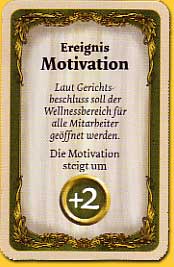 |
|
|
|
|
|
| x |
|
|
|
|
|
|
|
|
|
|
|
|
|
|
|
|
|
|
|
|
|
|
|
|
|
|
|
|
|
|
|
|
|
|
|
|
|
|
|
|
|
|
|
|
|
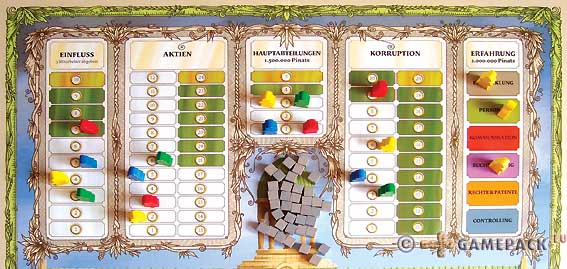 |
|
|
|
|
|
| x |
|
|
|
|
|
|
|
|
|
|
|
|
|
|
|
|
|
|
|
|
|
|
|
|
|
|
|
|
|
|
|
|
|
|
|
|
|
|
|
|
|
|
|
|
|
Machtspiele has some nice elements, but the elements do not form a good game. Everything you do can be undone by others immediately. As a result, all players crawl simultaneously though incredibly slowly up the various tracks, and they will all have collected four points at approximately the same time. Whoever manages to do it first depends on coincidence rather than anything else.
© 2010 Barbara van Vugt
Machtspiele/Power Struggle, Bauldric & Friends, Eggertspiele/Hutter Trade, 2009 - 3 to 5 players, 12 years and up, 90-120 minutes
|
|
|
|
|
|
  |
|
|
|
|
|
|
|
|
|
|
|
|
|
|
|
|
|
|
|
|
|
|
|
|
|
|
|
|
|
|
|
|
|
|
|
|
|
|
|
|
|
  |
|
|
|
|
|
|
|
|
|
|
|
|
|
|
|
|
|
|
|
|
|
|
|
|
|
|
|
|
|
|
|
|
|
|
|
|
|
|
|
|
|
  |
Original , but does not captivate and never gets fun |
  |
|
|
|
|
|
|
|
|
|
|
|
|
|
|
|
|
|
|
|
|
|
|
|
|
|
|
|
|
|
|
|
|
|
|
|
|
|
|
|
|
|
  |
|
|
|
|
|
|
|
|
|
|
|
|
|
|
|
|
|
|
|
|
|
|
|
|
|
|
|
|
|
|
|
|
|
|
|
|
|
|
|
|
|
| x |
|
|
|
|
|
|
|
|
|
|
|
|
|
|
|
|
|
|
|
|
|
|
|
|
|
|
|
|
|
|
|
|
|
|
|
|
|
|
|
|
|
|
|
|
|
| x |
|
|
|
|
|
|
|
|
|
|
|
|
|
|
|
|
|
|
|
|
|
|
|
|
|
|
|
|
|
|
|
|
|
|
|
|
|
|
|
|
|
|
|
|
|
 |
|
|
|
|
|
|
|
|
|
|
|
|
|
|
|
|
|
|
|
|
|
|
|
|
|
|
|
|
|
|
|
|
|
|
|
|
|
|
|
|
|
 |
|
|
|
|
|
|
|
|
|
|
|
|
|
|
|
|
|
|
|
|
|
|
|
|
|
|
|
|
|
|
|
|
|
|
|
|
|
|
|
|
|
| x |
|
|
|
|
|
|
|
|
|
|
|
|
|
|
|
|
|
|
|
|
|
|
|
|
|
|
|
|
|
|
|
|
|
|
|
|
|
|
|
|
|
|
|
|
|
 |
|
|
|
|
|
|
|
|
|
|
|
|
|
|
|
|
|
|
|
|
|
|
|
|
|
|
|
|
|
|
|
|
|
 |
|
|
|
|
|
|
|
|
|
|
|
|
|
|
|
|
|
|
|
|
|
|
|
|
|
|
|
|
|
|
|
|
|
|
|